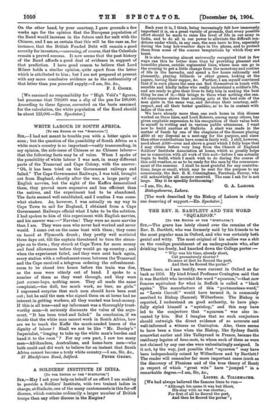WHITE LABOUR IN SOUTH AFRICA.
[To THE EDITOR OP THE "SPECTATOR."' SIR,—I had not meant to trouble you with a letter again so soon ; but the question of the possibility of South Africa as a white man's country is so important—vastly transcending, in my opinion, the side-issue of Chinese or no Chinese labour— that the following facts may be of value. When I spoke of the possibility of white labour I was met, in many different parts of the Transvaal and Cape Colony, with the answer: " Oh, it has been tried on the Government railways and failed." The Cape Government Railways, I was told, brought out from England, shortly after the war, a large party of English navvies, but the sight of the Kaffirs demoralised them, they proved more expensive and less efficient than the natives, and the experiment had to be abandoned. The facts seemed well established, and I confess I was some- what shaken. As, however, I was actually on my way to Cape Town to sail for England, I obtained from a Cape Government Railways official what I take to be the solution. I had spoken to him of this experiment with English navvies, and his answer was :—" Navvies ! They were no more navvies than I am. They were men who never had worked and never would. I came out on the same boat with them ; they came on board at Plymouth drunk ; they pretty well mutinied three days out, till the captain threatened to turn the steam- pipe on to them ; they struck at Cape Town for more money and food allowances before they would go up country ; and when the experiment failed, and they were sent back again, every station with a refreshment-room between the Transvaal and the Cape received a telegram ordering the refreshment- room to be closed two hours before the train was due, as the men were utterly out of hand. I spoke to a number of them as they went through, and they were just corner-boys, nothing more. They all made the same complaint,—too dull, too much work, no beer, no girls." I expressed surprise that such men should have been sent out ; but he said the men who signed them on at home had no interest in getting workers, all they wanted was head-money. If this is all true—and my informant was a thoroughly trust- worthy man—it seriously discounts the value of the argu- ment, " It has been tried and failed." In conclusion, if we decide that the white man cannot work in South Africa, how are we to teach the Kaffir the much-needed lesson of the dignity of labour ? Shall we not be like " Mr. Dooley's " Imperialist, "longing to take up the white man's burden and hand it to the coon " ? For my own part, I saw too many men—Afrikanders, Australians, and home-born men—who both could and did work to believe for an instant that South Africa cannot become a truly white country. —I am, Sir, &c., 27 Blackfriars Road, Salford. PETER GREEN.


































 Previous page
Previous page